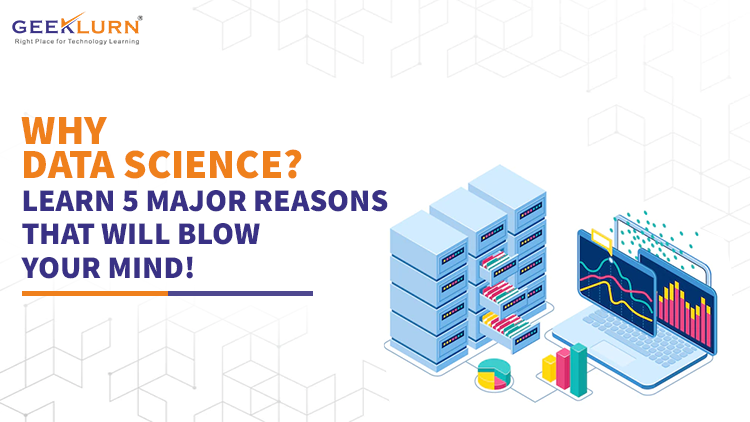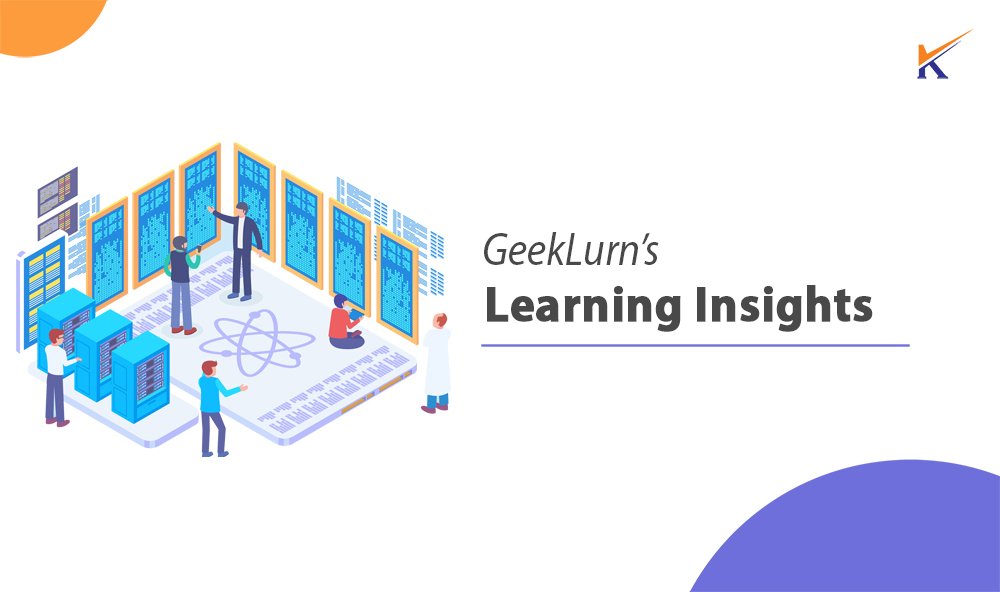Last Updated on: September 27, 2022
Data science is a mix of probability, statistics, data analytics, math and programming. It is ideal for organising Big Data, something that is not possible by traditional methods. The main objective of data science is capturing, processing and analysing massive datasets and extracting meaningful information. This is critical for business decision making, as incomplete or inaccurate data can generate wrong predictions. The impact of decision making with faulty data can range from lost opportunities to business blunders, threatening the very survival of the organisation. This is why data science is so critical for companies and they are willing to pay handsome salaries for data scientist positions.
The scope of data science is fast expanding. This is because human-generated data (from their online activities) is growing 10 times faster than conventional business data, while machine data (from sensors and smart devices) is growing 50 times faster. With this the demand for data scientists is at an all-time high in India. Along with being a lucrative career, here are some other reasons to learn data science.
Table of Contents
Top Reasons You Should Learn Data Science
1. Data Science and healthcare
Healthcare is one of the fastest-growing sectors in India and is expected to reach $372 billion in 2022. Data scientists can take advantage of this growing demand since the pharma industry leans heavily on data science for predicting diseases. This is done by ‘deep learning’ algorithms. It can drastically improve patient lifestyle and help doctors build an effective treatment strategy. This is why data science is important in genomic industries as well, to analyse the impact of drugs on genetic complexities. It can provide practical insights for data-driven decisions, boosting the quality of the health system. Being a data scientist in the healthcare domain can be extremely fulfilling, as you contribute to the overall well-being of people.
2. Covers skill gap
As per a report, India ranks 66th in the world in data science and technology skills. On the other hand, the demand for specialists in this field has been steadily growing. So, how to learn data science? The good news is that there are courses focusing on the knowledge and skills most relevant to closing this skill gap. For instance, individuals or companies can choose the data science course offered by NASSCOM-certified Geeklurn, as this focuses on both theoretical and practical aspects of the subject, aimed at making the student industry-ready. This is done through:
- 320+ hours of live interactive sessions with data scientists
- Opportunity to conduct research work
- Project work at authorised centres funded by IISC, ISB and IIM
You gain a deep understanding of the underlying concepts, while getting enough practical exposure to incorporate what you have learned in real-world scenarios. Equipped with this knowledge and experience, one can bridge the gap between skills and organisational demand.
3. Quick career growth
Are you still wondering why to learn data science? This field has been cited as the ‘most promising career’ by LinkedIn. Leading industries, like digital marketing, automotive, retail, healthcare, BFSI, media and entertainment and telecommunications, are actively hiring data scientists to add value to their business. The opportunity to work with some of the world’s largest companies is why some choose data science. The possibilities within data science have increased, both in terms of job opportunities and real-life applications. Although the field has grown significantly, it is still at a nascent stage, poised for robust expansion. This gives you enough scope to build a successful career.
4. Unmet demand and less competition
Hiring in the data science industry has increased by 46%. Still, around 93,000 jobs in the field were vacant in the country as of August 2020. Less competition means better opportunities to grab your dream job. This is one of the top answers to why you may want to learn data science. Get started by considering a course and learning the skills well. There are three main components: Big Data, Machine Learning and Modeling, covering topics like coding, business intelligence, mathematics, algorithms, and data structures. The demand for data scientists is expected to grow in the years ahead, with increased automation across industries.
5. Earn a good salary
The average salary of an Indian data scientist is ₹6,98,412 per annum. An entry-level executive can make approximately ₹5,00,000 annually. This will keep rising as your expertise and work experience grows and you gain specialisation in fast-growing industries. Skill enhancement and learning capabilities are two important factors in determining the salary slab. Jobs for data professionals are among the most lucrative in the non-technical arena and can help you achieve financial milestones quicker than other fields.
6. Data Is The Fuel Of The 21st Century
Data is the driving force behind several industries in the 21st century. Industries such as retail, healthcare, manufacturing, media, banking and finance etc. need to continually improve their performance, develop better products and services for the users, and grow their business. Data plays an important role in achieving these goals. Hidden patterns and trends in data give actionable insights which can change the operations of a business, making it more efficient and profitable. Additionally, data-driven strategies provide the organisation an edge over its competitors.
7. For Analysing Refugee Crisis
The global refugee crisis has led to the unfortunate deaths and displacements of several people. The United Nations and the World Bank have established a centre that uses data science to manage and regulate the information of refugees so that appropriate humanitarian actions can be taken. For example, based on the age, skills, income and gender of refugees, decisions can be made to help improve their lives.
8. High-Performance Computing To Answer Complex Data
High-Performance Computing is the use of powerful processors, parallel supercomputers and networks to tackle problems that are data-intensive. Cutting-edge HPC technologies have the power to fully exploit the potential of the largest supercomputers and multicore processors in the world. Despite these advancements however, data remains like a vast ocean that is growing in volume all the time. This is where data scientists can help organisations collect and make sense of the data.
How You Can Learn Data Science
There are 4 fundamental steps to learning data science. They are as follows:
1. Know the ‘why?’
Why do you want to learn data science? It is a very broad field and there’s a lot of information available about it. But this can confuse you and it could get difficult for you to decide what to focus on. This is where your ‘why’ can help you. Knowing your reason to learn can guide you on your learning journey.
2. Learn the fundamentals
After figuring out why do you want to learn data science, the next step is to make your foundation strong. Although data scientists work on projects related to machine learning, artificial intelligence, and neural networks, the fact remains that they spend a lot of their time gathering and cleaning data. So, you can’t skip learning the fundamentals and jump directly on to the bigger, more glamorous stuff.
3. Learn From Peers
When you work with others, you learn a lot. That’s why learning to collaborate with others is essential. When you are trying to learn data science, get together with your peers and brainstorm. You can either find people to work with at data science meetups, or you could join a data science and architecture course, or you can get in touch with people who write interesting data analysis blogs, or you could contribute to open-source packages. The possibilities are endless.
4. Learn to communicate
Data scientists need to present the results of their analyses to important stakeholders within the organisation. So, knowing how to communicate effectively and in an easy-to-understand manner is of utmost importance. There’s no point to all your research and analysis if you can’t communicate the findings and insights in an efficient manner.
Best Tools And Platforms To Learn Data Science
It is important to choose the correct platform to learn data science concepts. Here are a few we recommend:
Kaggle
Kaggle provides you with hands-on experience required for a data scientist. It is the biggest platform for machine learning in the world and has over 23,000 public datasets. These datasets can be used for practicing and enhancing your skills.
edX
edX, as you must be aware, is a joint venture between Harvard University and the Massachusetts Institute of Technology. It is one of the largest open online course providers and hosts free and paid data science courses. Some data science related courses edX hosts are in Machine Learning, Python, Artificial Intelligence, R Programming and Deep Learning.
Codecademy
This is an online interactive platform that offers free classes to aspiring data scientists. It has classes for 12 programming languages including Java, JavaScript, SQL, Python, Go, Ruby, C++, C#, to name just a few.
HackerRank
According to their website, “HackerRank is a place where programmers from all over the world come together to solve problems in a wide range of Computer Science domains.” People can practice algorithms, machine learning, artificial intelligence, and even functional programming.
The bottom line
The application of data science is beyond business intelligence. All types of industries including social organisations are becoming increasingly data driven. This is why data science is one of the fastest-growing fields in the country and the number of open analytics and data science jobs spiked by 30% year-on-year in April 2022.
Data Science FAQs
1. What is Data Science?
2. What is the scope of data science in India?
3. What are the industries where data science is highly used?
Banking & Financial Industry
Media, Advertising, & Marketing
Healthcare and Medicine
Government
Manufacturing
Tech startups
Retail
Construction and Real Estate
Transportation and Logistics
Education






